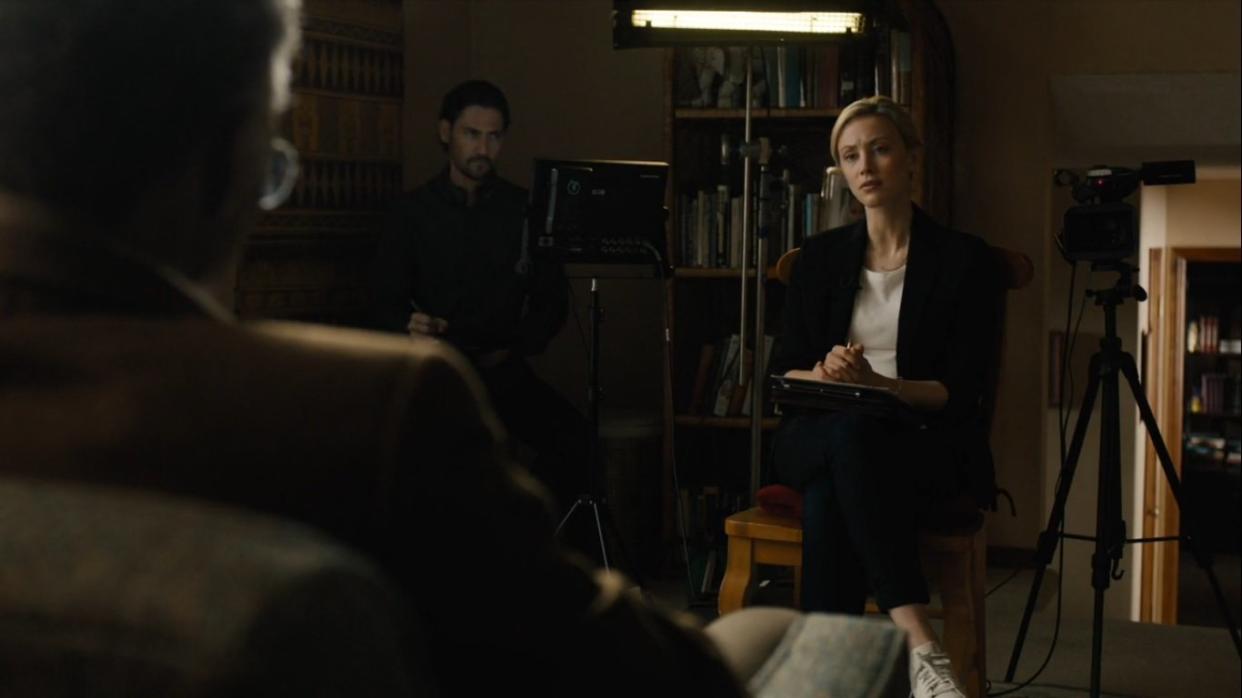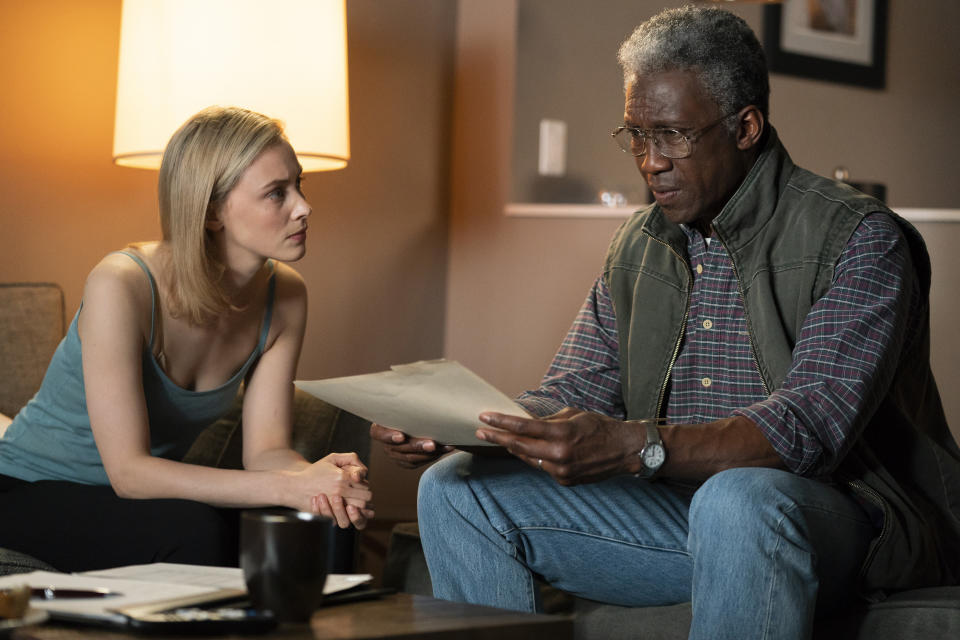'True Detective' Star Had No Idea What Was Happening In Season 3

During their final sit-down for her documentary, “True Criminal,” journalist Elisa Montgomery (Sarah Gadon) stares down dementia-ridden detective Wayne Hays (Mahershala Ali), relentlessly questioning him about the missing children case that’s haunted him for 35 years. Could it be that Will and Julie Purcell’s disappearance is connected to a wider ring of criminals? She thinks so.
“In 2012, two former Louisiana state police stopped a serial killer associated with some kind of pedophile ring. Despite evidence of accomplices, the case never went wider,” she says, alluding to the thrilling investigation in “True Detective” Season 1 by Rust Cohle (Matthew McConaughey) and Marty Hart (Woody Harrelson). “I think what happened to the Purcell children was connected to a similar group. I think one or both of their parents sold them off, probably with the cousin’s help. That’s why they’re all gone, vanished, killed, kept silent.”
With that monologue, Gadon’s character was elevated from random documentarian to Theory Queen by “True Detective” fans.
When the actress, who is best known for her 2017 performance in the Margaret Atwood book-turned-miniseries “Alias Grace,” originally signed on to Nic Pizzolatto’s tentpole HBO show, she just knew that she’d be playing a journalist investigating a crime in the Ozarks. Gadon was given only her own scenes in the script ― and left in the dark when it came to Ali and Stephen Dorff’s pivotal roles as officers Hays and Roland West.
She soon discovered that her character would speak to a larger through line crafted by creator Pizzolatto — one that would make viewers’ heads spin with a Season 1 connection.
Below, Gadon talks about her small but pivotal role on “True Detective” and admits, unashamedly, that she watched Ali win an Oscar instead of catching Season 3’s final episode.

So did you attend any of the Oscar parties Sunday night?
No, I definitely did not. I was having a little viewing party at my house with some friends, in sweatpants, eating takeout. It was fun!
Sounds way more fun. But the finale of “True Detective” Season 3 was also airing. And I must say, for playing a small role in the show, Elisa Montgomery becomes a pretty big part of the grand scheme of things. How did you get involved with the series?
I think because “True Detective” has been such a popular TV show, I auditioned for the role not really knowing anything about it. I didn’t read any scripts. I just got a very brief character breakdown and the scenes, and I thought the scenes were really interesting. I could kind of tell from the writing what they were trying to do with the character, so I auditioned and got the part.
In light of our TV obsession with true crime, the Season 1 tie-in and this character seem particularly perfect. Did that draw you to the role as well?
Yeah, absolutely. I like the genre and I’ve had a lot of fun exploring it when I did “Alias Grace.” I knew interview method was very integral to the storytelling and the plot, but I thought what was unique was adding this layer of having the true crime journalist, the sycophant, the person who’s trying to come at it from a different angle projecting onto the crime all of their own experiences and biases and perspective of privilege. I thought that was an interesting thing that I hadn’t seen done in the genre, so I was really excited about that plot line.
Her scenes challenge the viewer’s expectations and illustrate how easily one’s own theories or experiences can taint a detective’s investigation.
Absolutely. I think that oftentimes as a journalist when you’re interviewing someone, you can’t help but bring your own background to the conversation. And sometimes that can ultimately confuse whatever the conversation is trying to be. I’m not testing you at this point [laughs]; I’m just saying that that is what I found really curious about it. Also, as an actor, I was drawn to that dynamic because it is rare to have the cat-and-mouse interview style dialogue happening in the middle of a true crime show.
I could bring my own expectations to our conversation, and I will as an entertainment journalist who is constantly watching these sorts of shows as a TV detective. I found Elisa to represent the viewers who are trying to tie everything together from Seasons 1 and 3. Did you sense that as well when you talked to Nic Pizzolatto about the role?
Not really. It was a challenge because I didn’t actually get to read any of the script. I was only given my scenes, which was really tough because I didn’t have an idea of how my character was going to tie into other things. I wasn’t allowed to read it! But when Nic directed and the other directors came in, I would ask, “What does this actually mean? Am I alluding to this?” So they were kind of guiding me through the process. It was definitely a unique experience. I never had done anything like that before.
Did they keep the scripts secret for a reason?
I don’t know! I mean, I think that sometimes when shows or films are really popular, they don’t want anything to leak, and I know that was a problem with Season 2, that someone had leaked the script. So that was, obviously, a concern for them. But it’s been interesting.
I’m not fully caught up on the show. Usually, you don’t run to watch your own work! In this case, though, I was curious to watch the entire show because I don’t really know what’s going to happen. I haven’t watched the season finale yet!
I can’t even spoil anything that happens then!
Yeah, don’t spoil anything for me!
Well, Nic Pizzolatto tends to stay away from big plot twists or overdone finales. And this episode, like many others, had a noir vibe to it, exploring more about the characters than the crime. So did your parts of the script ever give you an idea of the direction he was heading? Or was it truly “I have no idea what else is going on”?
There was a little bit of that for sure. It’s interesting that you say noir because I would really agree in the sense that I think it is very much a character study in human behavior. And what I really like is that a lot of his writing in our scenes felt very literary, especially the character that I was playing. That is a representation of a journalist that you don’t often see on TV. You have the journalist who’s the interloper, but what I liked about her was everything felt so academic about the way she was speaking. At moments I found it could almost be kind of funny because she’s looking at this case in such an objective way, in such a detached way, and trying to draw these greater themes, like the intersectionality of oppressed people. She’s speaking from such a privileged perspective and Mahershala really grounds everything and takes back a lot of power, essentially saying, “I don’t want to be perceived in such a detached, literal way.”
What was it like working opposite someone like Mahershala Ali?
It was such a treat. He is such an incredible actor, but he’s also really an incredible person. He carries the show with such grace. As a younger actor, it was really lovely to see how generous he was with me and the other cast members. It was also just a joy to watch him lead in such a powerful but respectful way. Sometimes interview scenes with two people sitting and speaking with each other can be a bit boring for the crew because there isn’t a lot for them to be doing. And instead of letting the tone of the set rush us for our lines and rush us through our scene, he made sure we had the time and the space we needed to get the material in and find the moment within all of the dialogue. To see him lead and at the same time take the space he needed to make sure the work was going to be great at the end of the day was amazing.
I noticed there was a script supervisor sitting behind you in most scenes. I thought he looked like someone from Season 2 and began theorizing, of course. It turned out I was very incorrect. So who is that guy?
[Laughs] He’s a background actor, and there was another actor also playing the camera operator. They were such troupers because we shot often with three cameras, which meant that their body positioning could make or break the shot. It seems like such an easy thing being in the background, but it’s also a real test of endurance for them.
Putting those background actors in there, as well as your character’s role or the straw dolls in the crime scene, felt like little tricks to troll the viewers. Were you a Season 1 watcher yourself, and did you see any similarities right away when reading your scenes?
Yeah, I did. I love Season 1 and it’s become this real touchstone for television. It was one of the first examples of a director directing an entire season of television and it really became an example of doing television in a nontraditional way. And so, of course, I was looking for all the similarities between this season and the first.
The finale does offer a little hint that your investigation could continue so we’ll see what’s to come.
I’d love that.
Speaking of, will your true crime documentary ever air on Netflix?
[Laughs] That’s amazing! What a great idea. Maybe there can be competing documentaries: one for Netflix and one for Hulu.
The new Fyre Fest [documentaries].
Let’s start the campaign right here.
Related Coverage
What To Expect From 'True Detective' Season 3, Another Crime Show Set In The Ozarks
In The Age Of Conspiracy TV, We Can't Help But Watch 'True Detective' All Wrong
Mahershala Ali Wins Best Supporting Actor Oscar For ‘Green Book’
Love HuffPost? Become a founding member of HuffPost Plus today.
This article originally appeared on HuffPost.

